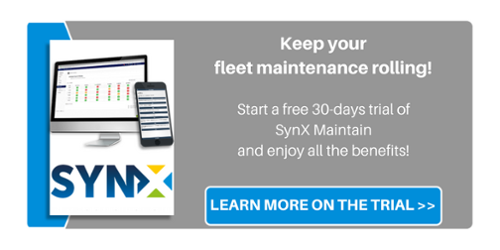
In any fleet management operation, whether large or small, there are so many things to take care of that multitasking happens frequently; there are certain things we just cannot ignore or eliminate, and we therefore have to make them work simultaneously or find ways for them to coexist.
Within a fleet, two crucial things that need to coexist as far as possible—and it might have actually already come to your mind—are keeping vehicles on the road and maintenance. Apart from unplanned interventions caused by breakdowns, finding the time to make vehicles that need regular maintenance available can become a real challenge if you need them on a daily basis, yet maintenance is what keeps them running! How then can you make the most of your maintenance time while keeping vehicles on the road?
#1 - Perform regular vehicle checks. Apart from the obvious compliance obligations, as walkaround checks are a legal requirement, regular vehicle inspections really need to be insisted upon. Small, regular verifications are the ones that allow problems to be found before they escalate and become a serious or very expensive issue that not only incurs unplanned downtime but also impacts on your budget.
#2 - Focus on maintenance that improves fuel efficiency. Make maintenance a really comprehensive task that includes any aspect that may potentially lead to downtime. Fuel efficiency is of great importance for your budget, so your maintenance procedures should ensure that vehicles are operating at maximum efficiency: a point to bear in mind is that fuel efficient vehicles probably do not need extra maintenance outside the regular schedules, and inefficient vehicles might actually suggest there are issues going on that could lead to downtime. So make sure fuel efficiency is also made a priority from a maintenance point of view in order to keep vehicles on the road.
#3 - Beware of unnecessary repair costs—and downtime. Saying that fleet maintenance is necessary, especially regular maintenance, does not mean all fleet maintenance events are absolutely needed. There should be a schedule based on intelligent criteria that corresponds to manufacturer recommendations and your activity as a whole, but it might not be necessary to have regular intensive maintenance interventions—you have to distinguish what is necessary from what isn’t. Unneeded maintenance might potentially lead to extra downtime, apart from hurting your pockets—make sure you choose wisely.
#4 - If your fleet puts a lot of miles on its vehicles, make sure you pay attention to brakes and tyre condition as it might become critical. Tyres need to be properly checked and replaced in case they have hard signs of wear as this impacts on global vehicle safety and ultimately on fuel consumption. Checking tyres carefully is a step toward keeping vehicles on the road.
#5 - Keep tabs on maintenance events. If you have full visibility on maintenance interventions and vehicle checks as well as on their frequency, you will be able to plan accordingly and optimise the time they spend on the road—it’s a completely different story if you do not record checks and fleet activity...



